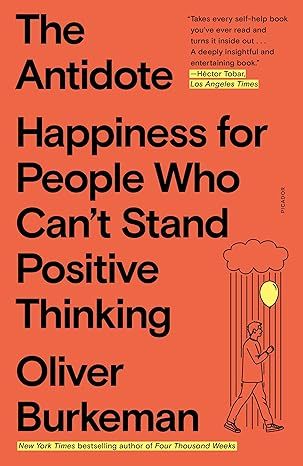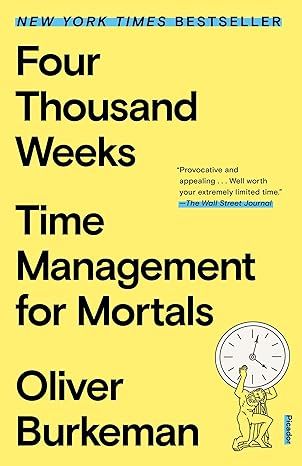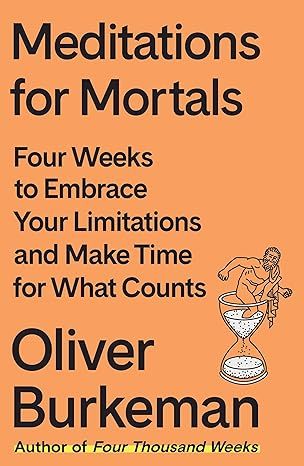AntidoteKindle
4.5
-
2,825 ratings
From the author of the New York Times -bestselling Four Thousand Weeks , a totally original approach to self-help: success through failure, calm through embracing anxiety.
Self-help books don't seem to work. Few of the many advantages of modern life seem capable of lifting our collective mood. Wealth―even if you can get it―doesn't necessarily lead to happiness. Romance, family life, and work often bring as much stress as joy. We can't even agree on what "happiness" means. So are we engaged in a futile pursuit? Or are we just going about it the wrong way?
Looking both east and west, in bulletins from the past and from far afield, Oliver Burkeman introduces us to an unusual group of people who share a single, surprising way of thinking about life. Whether experimental psychologists, terrorism experts, Buddhists, hardheaded business consultants, Greek philosophers, or modern-day gurus, they argue that in our personal lives, and in society at large, it's our constant effort to be happy that is making us miserable. And that there is an alternative path to happiness and success that involves embracing failure, pessimism, insecurity, and uncertainty―the very things we spend our lives trying to avoid.
Thought-provoking, counterintuitive, and ultimately uplifting, The Antidote is the intelligent person's guide to understanding the much-misunderstood idea of happiness.
Kindle
$3.99
Available instantly
Audiobook
$0.99
with membership trial
Hardcover
$1.83
Paperback
$11.39
Ships from
Amazon.com
Payment
Secure transaction
ISBN-10
1250860407
ISBN-13
978-1250860408
Print length
256 pages
Language
English
Publisher
Picador Paper
Publication date
August 08, 2022
Dimensions
5.4 x 0.65 x 8.2 inches
Item weight
8 ounces
Popular Highlights in this book
What actually causes suffering are the beliefs you hold about those things.
Highlighted by 2,135 Kindle readers
‘If you accept that the universe is uncontrollable,’ Ellis told me, ‘you’re going to be a lot less anxious.’
Highlighted by 1,635 Kindle readers
Confronting the worst-case scenario saps it of much of its anxiety-inducing power. Happiness reached via positive thinking can be fleeting and brittle; negative visualisation generates a vastly more dependable calm.
Highlighted by 1,548 Kindle readers
Product details
ASIN :
B0080K3G4O
File size :
1726 KB
Text-to-speech :
Enabled
Screen reader :
Supported
Enhanced typesetting :
Enabled
X-Ray :
Enabled
Word wise :
Enabled
Editorial reviews
Review
“Burkeman's tour of the ‘negative path' to happiness makes for a deeply insightful and entertaining book. This insecure, anxious and sometimes unhappy reader found it quite helpful.” ―Hector Tobar, The Los Angeles Times
“Some of the most truthful and useful words on [happiness] to be published in recent years . . . A marvellous synthesis of good sense, which would make a bracing detox for the self-help junkie.” ―Julian Baggini, The Guardian
“The Antidote is a gem. Countering a self-help tradition in which ‘positive thinking' too often takes the place of actual thinking, Oliver Burkeman returns our attention to several of philosophy's deeper traditions and does so with a light hand and a wry sense of humor. You'll come away from this book enriched--and, yes, even a little happier.” ―Daniel H. Pink, author of Drive and A Whole New Mind
“Quietly subversive, beautifully written, persuasive, and profound, Oliver Burkeman's book will make you think--and smile.” ―Alex Bellos, author of Here's Looking at Euclid
“Addictive, wise, and very funny.” ―Tim Harford, author of The Undercover Economist
“What unites [Burkeman's] travels, and seems to drive the various characters he meets, from modern-day Stoics to business consultants, is disillusionment with a patently false idea that something as complex as the goal of human happiness can be found by looking in a book . . . It's a simple idea, but an exhilarating and satisfying one.” ―Alexander Larman, The Observer
“This is an excellent book; Burkeman makes us see that our current approach, in which we want happiness but search for certainty--often in the shape of material goods--is counterproductive.” ―William Leith, The Telegraph
“Fascinating . . . After years spent consulting specialists--from psychologists to philosophers and even Buddhists--Burkeman realised they all agreed on one thing: . . . in order to be truly happy, we might actually need to be willing to experience more negative emotions--or, at least, to learn to stop running so hard from them.” ―Mandy Francis, The Daily Mail
“Splendid . . . Readable and engaging.” ―British Chief Rabbi Jonathan Sacks, The Times (London)
About the Author
Oliver Burkeman worked for many years at The Guardian, where he wrote a popular weekly column on psychology, “This Column Will Change Your Life.” His books include the New York Times bestseller Four Thousand Weeks: Time Management for Mortals and The Antidote: Happiness for People Who Can’t Stand Positive Thinking.
Read more
About the authors
Oliver Burkeman
Oliver Burkeman is a British author and journalist, formerly writing the weekly column This Column Will Change Your Life for the newspaper The Guardian. In 2021, he published Four Thousand Weeks: Time Management for Mortals, a self-help book on the philosophy and psychology of time management and happiness.
Reviews
Customer reviews
4.5 out of 5
2,825 global ratings

Diana Robinson
5
The path to serenity via acceptance of uncertainty... and more
Reviewed in the United States on September 25, 2016
Verified Purchase
An excellent book, particularly for people experiencing "existential angst" (my definition being that they feel depressed and anxious about their lives, the state of the world in general, and their place in it). The author basically examines the belief in positive thinking and the mental denial of failure, and points out the extent to which such beliefs frequently lead do NOT lead to happiness, but to feelings of disappointment and self-blame. He then embarks on an easily read examination of a series of philosophies, philosophers, and research sources to discover how one can more effectively find tranquility by embracing uncertainty and acceptance of what may be - whatever it may be.
The extraordinarily well-read author's path leads us from Seneca and the Stoics, past some disadvantages of goal-setting to Ulrich Tolle and the benefits of insecurity. He pays a rather entertaining visit to a museum dedicated to products that failed in the marketplace, the "survivor bias," and a discussion about the widespread avoidance of thoughts about death. Each of these is a starting point for his very cogent thoughts and research about a specific aspect of the journey on which he is taking the reader.
I must admit to having been somewhat of a convert to the author's philosophy before picking up the book, so that there is some bias here, but I truly believe that most Westerners would benefit greatly from reading this book slowly and thoughtfully. True, there was a point in mid-read when either my mind wandered, or the author did not clearly explain the connection between the current topic and his main line of thought. However, he (or I) returned well before the end and left me extremely glad to have read it.
In his Epilogue, Burkeman uses two expressions with which I was not familiar but which were particularly interesting to me: First, "negative capability," reportedly coined by the poet John Keats who explained it as "when [one] is capable of being in uncertainties, mysteries, doubts, without any irritable reaching after fact and reason..." Second is a word that may have the same meaning, acceptance of "opensure," which is the opposite of closure. As a counselor and coach I have often thought that if people could end their search for certainty and/or closure they would be much happier, and I am pleased to find a word that describes that state.
The very thoroughly researched text ends with an extensive bibliography, so that the curious can go to sources quite easily.
I recommend Oliver Burkeman's "The Antidote" to just about anyone whose search for certainty, or belief in positive thinking as the path to happiness, have not actually led them to the tranquility that they seek. That would probably be most people.
Read more
99 people found this helpful
Gaianyogi
5
The negative path to happiness
Reviewed in the United States on August 24, 2023
Verified Purchase
This book is an anti-positive thinking handbook. Refreshing to say the least! It is a compendium of the best of Stoic principles, Buddhism, anti-goal striving, Alan Watts wisdom, Eckhart Tolle wisdom, and reflections on our own mortality. It is not "new agey" in the slightest. It gets down to hard, pragmatic issues and doesn't shy away from evidence that positive thinking simply doesn't work. What I like most about it is how it weaves together the above strands of wisdom to create a picture of tried-and-true methods that help bring tranquility and peace. It isn't religious or "preachy" in any way. It is a toolbox and a good one at that.
This book was written in 2012 and its message is still resonant today - even more so - given the world's unstable political, economic, and social climates as well as climate change. I bought both the kindle and paperback editions - I liked it that much. I don't do that with many books. I am on my second reading now but this is one of those books where you can read it many times. Just the references to other works and studies makes it worth it. My only criticism are there are no linked references in the kindle edition and the page numbers don't match that of the paperback. Other than that, it's great.
Read more
6 people found this helpful
N. Hamlin
5
pops the toxic positivity bubble
Reviewed in the United States on July 30, 2024
Verified Purchase
Nothing wrong with being optimistic, just not smart to be unrealistic.
m
5
Great enjoyable book
Reviewed in the United States on February 21, 2014
Verified Purchase
I completely and thoroughly enjoyed this book. I found it engaging and entertaining as well as helpful in redefining my outlook in life. There where many useful concepts within the book as well as explanations of why some common ideas don’t work even though they are widely accepted advice. For example, I have always hated affirmations, finding them a waste of my time and often found that they uprooted emotions of anger within- working against improving my self-worth issues. It was nice to finely understand why this was the case and what I can do that would actually work for me, instead.
This book is about re-definition not about how to survive the status quos. It will point into the direction of self-discovery and personal change but it will only help you if you are willing to dig deep into your own mind to find the flaws in your thinking. This is not a “ do this and that will happen” type of book; it’s not a receipt book. It does not give you answers- it provokes thinking. This book is far better than the numerous other self-help books I have read, because it takes into account that we all have different needs, we all came from different roads even if we ended at the same intersection. Happiness is a personal interpretation; it means different things to different people since we all have different personal emotional needs. I believe this book can help dismiss the fallacy that happiness comes from the outer physical world of materialism and/or the interactions between people in your life. True happiness must come from within and this book in a fun and enjoyable way has tough me how to understand and tap into to beauty within.
I highly recommend this book, it’s an easy and enjoyable read, it can also be useful for the struggling young high school student, too. I have already passed it on to others in my life I though could benefit from its wisdom. I have also purchased it on audio C/D for my husband to listen in the car on his way to work.
If you’re considering this book buy it, you won’t regret it.
Read more
5 people found this helpful
Elissa Wurf
5
Imperfectly Wonderful (but he helps you see the value in the imperfections)
Reviewed in the United States on February 17, 2013
Verified Purchase
The full title of this book--"The Antidote: Happiness for People who Can't Stand Positive Thinking," implies that positive thinking can be a problem and that this book provides a solution. However, the statement that "positive thinking is a problem" would be too strongly worded--and the idea that positive thinking is a problem for only some people would be too limiting.
What is problematic, as this book points out, is over-attached positive thinking. It's more the ATTACHMENT to positive goals than the fact that the goals are positive that is the problem. And this is a problem for MOST people in Western culture, not just those who are cynical enough to be repelled by Norman Vincent Peale and his ilk.
Through an amusing array of journalistic anecdotes--his visits to places such as the Insight Meditation Center in Barre MA, "The Museum of Failure" in Ann Arbor, the death shrine in Tepito, Mexico and to a lively cemetary during Dia de los Muertos (Day of the Dead) in Mexico, or the slum of Kibera in Kenya, and his interviews or summaries of the work of characters such as the ever-crusty Albert Ellis, the ephemeral Eckhardt Tolle, or security expert Bruce Schneier (noted for his opposition to the 9/11 security crackdown)--Burkman makes his case for "the negative path to happiness."
The negative path to happiness is to embrace insecurity, failure, and death--to learn that these are inevitable aspects of life, and to gain the perspective that death and impermanence are the very things that make life and our positive experiences so precious, and that our repeated failures are what lead us to eventually succeed--and to, above all, learn perspective and non-attachment to experiences and outcomes, and the art of non-doing, in opposed to our more typical goal-striving and grasping, which often ironically backfire to make us miserable rather than happy.
In the course of the book, Burkman reviews approaches such as those of the Stoic philosophers and the Buddhists, and touches on psychological theories such as Dan Wegner's theory of ironic processes (
Read more
79 people found this helpful
Top Oliver Burkeman titles
View allBest Sellers
View all
The Tuscan Child
4.2
-
100,022
$8.39

The Thursday Murder Club: A Novel (A Thursday Murder Club Mystery)
4.3
-
155,575
$6.33

Sapiens: A Brief History of Humankind
4.6
-
140,302
$13.49

The Butterfly Garden (The Collector, 1)
4.3
-
88,556
$9.59

Things We Hide from the Light (Knockemout Series, 2)
4.4
-
94,890
$11.66

The Last Thing He Told Me: A Novel
4.3
-
154,085
$2.99

The Perfect Marriage: A Completely Gripping Psychological Suspense
4.3
-
143,196
$9.47

The Coworker
4.1
-
80,003
$13.48

First Lie Wins: A Novel (Random House Large Print)
4.3
-
54,062
$14.99

Mile High (Windy City Series Book 1)
4.4
-
59,745
$16.19

Layla
4.2
-
107,613
$8.99

The Locked Door
4.4
-
94,673
$8.53



